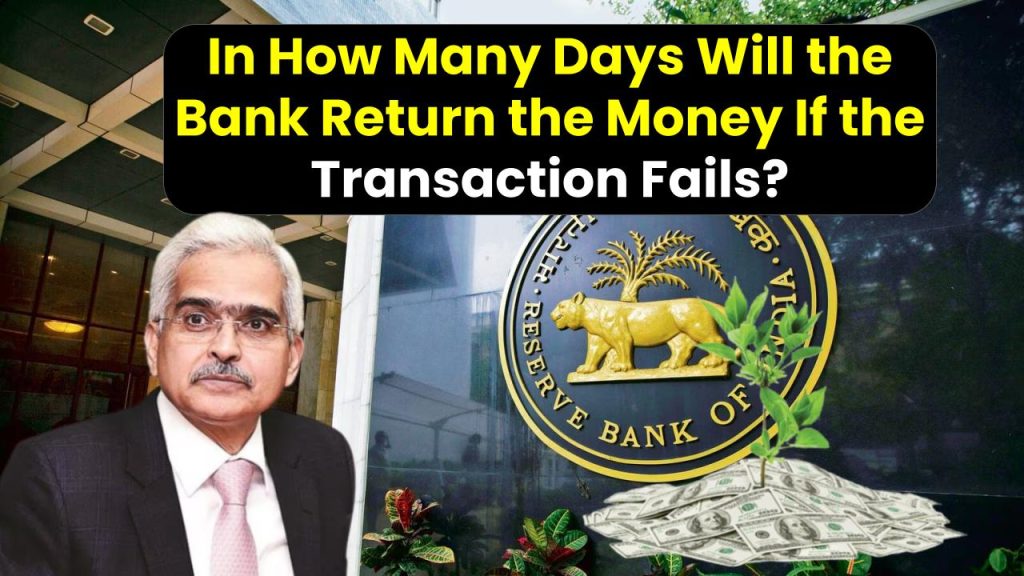
Have you ever tried withdrawing cash from an ATM or sending money online—only to find that the amount got deducted from your account but didn’t reach the receiver? Or worse, the ATM didn’t dispense the cash, but your balance went down anyway? Don’t worry—you’re not alone, and the Reserve Bank of India (RBI) has laid down clear, time-bound rules to protect you in such cases.
The RBI refund timeline rules for failed transactions are designed to ensure that you get your money back promptly. Whether it’s UPI, IMPS, ATM, or card-based transactions, the RBI has specified the number of days your bank has to auto-reverse the amount, and it has also set penalties if the bank delays your refund. Here’s a detailed guide to help you understand your rights and what action to take if a transaction fails.
RBI Refund Rules for Failed Transactions
| Point | Details |
|---|---|
| Applicable To | ATM, UPI, IMPS, NEFT, PoS, Card, Wallet & Aadhaar-based transactions |
| Auto-Reversal Period | Between T+1 to T+5 days (T = date of transaction) |
| Compensation | ₹100 per day for delays beyond stipulated timeframe |
| Where to File Complaint | With your bank or through RBI CMS |
The RBI’s refund rules for failed transactions ensure that your money doesn’t disappear into a black hole. Whether it’s UPI, ATM, or PoS, banks and payment systems are bound by strict deadlines and penalties to return your funds.
Knowing these timelines—and your rights—an save you time, stress, and even money. And if a bank doesn’t play fair? You’ve got RBI on your side.
What Are Failed Transactions?
A failed transaction occurs when money is debited from your account, but:
- The recipient doesn’t receive it
- Cash is not dispensed from an ATM
- Merchant doesn’t receive confirmation
- Or the amount gets stuck in processing
These glitches can happen due to server errors, poor internet connection, ATM malfunctions, or technical issues in inter-bank settlement systems. But the good news? The RBI mandates banks and payment providers to resolve these quickly.
see also: You Can Create a Fund of ₹1 Crore by Investing ₹3,000 in SIP
RBI Rules on Refund Timelines by Transaction Type
Let’s break down the refund timeline rules by the kind of transaction you make.
ATM Transactions (Including Micro ATMs)
- Issue: Cash not dispensed but amount debited
- Refund Timeline: T + 5 calendar days
- Compensation: ₹100 per day for delay after T+5
Example: If you used an ATM on March 1 and the cash didn’t come out, your bank must refund the amount by March 6.
Card-to-Card and Point-of-Sale (PoS) Transactions
Card-to-Card Transfers
- Issue: Debited from your card, but recipient didn’t get it
- Refund Timeline: T + 1 day
- Compensation: ₹100 per day beyond T+1
Card Present (In-store PoS)
- Issue: Card swiped, money debited, but charge-slip not generated
- Refund Timeline: T + 5 days
UPI (Unified Payments Interface)
Person-to-Person Transfers
- Issue: Amount debited, but recipient didn’t get it
- Refund Timeline: T + 1 day
- Compensation: ₹100/day for delay beyond T+1
Merchant Payments
- Issue: Transaction fails on merchant end
- Refund Timeline: T + 5 days
Note: UPI apps like PhonePe, Google Pay, and Paytm must follow these RBI timelines too.
IMPS (Immediate Payment Service)
- Issue: Debited but not credited to recipient
- Refund Timeline: T + 1 day
- Compensation: ₹100/day beyond T+1
Aadhaar-Enabled Transactions
Aadhaar Payment Bridge System (APBS)
- Issue: Amount not credited to Aadhaar-linked account
- Refund Timeline: T + 1 day
Aadhaar Pay or AEPS
- Issue: Failed withdrawal from merchant terminal
- Refund Timeline: T + 5 days
National Automated Clearing House (NACH)
Used for ECS/auto-debits like utility bills or SIPs.
- Issue: Amount debited but not credited or reversed
- Refund Timeline: T + 1 day
Prepaid Wallets (PPIs like Paytm Wallet, PhonePe Wallet)
On-Us Transactions (Same platform)
- Refund Timeline: T + 1 day
- Compensation: ₹100/day for delay
Off-Us Transactions (Linked with UPI/card)
- Refund depends on system used (e.g., UPI rules apply)
What Should You Do If Money Is Not Refunded on Time?
Here’s a step-by-step guide to help you take action:
Step 1: Wait for the Reversal Period
Each type of transaction has a set deadline. If your money is not refunded by:
- T + 1 to T + 5 days, depending on transaction type
- Then proceed to step 2
Step 2: Raise a Complaint With Your Bank
- Call customer care or visit the branch
- Share transaction ID, date, and your account number
- Ask for compensation (₹100/day) if eligible
Step 3: Escalate to RBI via CMS
If the bank doesn’t respond in 30 days, file a complaint on the RBI portal:
https://cms.rbi.org.in
You’ll need:
- Transaction proof
- Bank complaint ID
- Screenshots or receipts (if applicable)
Why These Rules Matter – Real-Life Impact
Let’s say you try to send ₹5,000 to your friend using UPI. The app shows “Transaction Failed,” but ₹5,000 is gone from your account.
- You panic—but don’t need to!
- Wait one working day (T + 1)
- If it’s not back, lodge a complaint
- By law, the bank must compensate ₹100 per day for delay
These rules keep the banks accountable and protect consumers, especially when digital payments are booming.
The Growing Importance of Digital Transaction Safety
As of January 2025, India processes:
- Over 1.2 billion UPI transactions per day (Source: NPCI)
- ATM usage has declined, but issues still persist, especially in rural areas
- RBI’s Consumer Charter ensures transparency and grievance redressal
According to RBI’s Annual Report, most complaints in 2023-24 were related to:
- ATM failures
- Unauthorized UPI transfers
- Refund delays
That’s why knowing these rules gives you power as a digital consumer.
see also: In This Scheme of Post Office, You Will Get 10 Lakhs on Investing 5 Lakhs
Bank Return the Money If the Transaction Fails FAQs
Q. What is T in T + 5 days?
T stands for the day of the transaction. So, T+5 means five calendar days after the transaction.
Q. What if the refund doesn’t come even after 7 days?
Raise a complaint with your bank, and if unresolved in 30 days, escalate it to RBI via https://cms.rbi.org.in.
Q. Do I get ₹100 per day automatically?
No. You need to ask for it when complaining to the bank. The RBI mandates it, but you must claim it.
Q. Does this apply to credit cards too?
Yes. If the credit card is debited but service or goods are not received, the same rules apply for reversal.
Q. Is there a number I can call for RBI-related complaints?
You can contact RBI’s toll-free number: 14440 or visit https://cms.rbi.org.in.











